 W
WThe siege of Almeida took place in August 1762 when a Spanish force besieged and captured the city of Almeida from its Portuguese defenders during the Seven Years' War. The city was taken on 25 August as part of the invasion of Portugal by a Spanish army commanded by the Count of Aranda.
 W
WThe Capture of Belle Île was a British amphibious expedition to capture the French island of Belle Île off the Brittany coast in 1761, during the Seven Years' War. After an initial British attack was repulsed, a second attempt under General Studholme Hodgson forced a beachhead. A second landing was made, and after a six-week siege the island's main citadel at Le Palais was stormed, consolidating British control of the island. A French relief effort from the nearby mainland was unable to succeed because of British control of the sea. The British occupied the island for two years before returning it in 1763 following the Treaty of Paris.
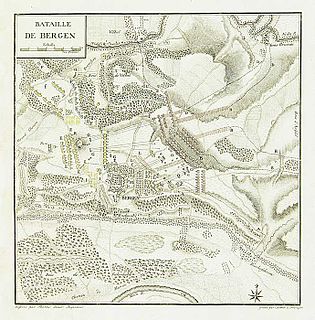 W
WThe Battle of Bergen on 13 April 1759 saw the French army under de Broglie withstand an allied British, Hanoverian, Hessian, Brunswick army under Prince Ferdinand of Brunswick near Frankfurt-am-Main during the Seven Years' War.
 W
WThe Raid on Berlin took place in October 1760 during the Third Silesian War when Austrian and Russian forces occupied the Prussian capital of Berlin for several days. After raising money from the city, and with the approach of further Prussian reinforcements, the occupiers withdrew. There were later allegations that the Russian commander Count Tottleben had received a personal bribe from the Prussians to spare the city, and he was subsequently tried and found guilty of being a spy.
 W
WThe Battle of Breslau was a battle fought on 22 November 1757 in Breslau during the Third Silesian War. A Prussian army of 28,000 men fought an Austrian army of 84,000 men. The Prussians held off the Austrian attack, losing 6,000 men to the Austrians 5,000 men. But one day later the Prussians beat a retreat. Breslau's garrison surrendered on 25 November 1757.
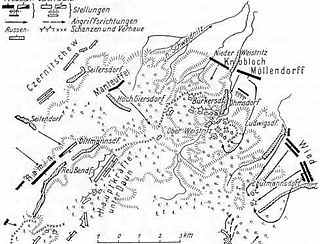 W
WThe Battle of Burkersdorf was a battle fought on 21 July 1762 during the Third Silesian War. A Prussian army of 40,000 men fought an Austrian army of around 30,000 men.
 W
WThe Battle of Carrickfergus took place in February 1760 in Carrickfergus, Kingdom of Ireland during the Seven Years' War. A force of 600 French troops landed under the command of the Privateer François Thurot, overwhelmed the small garrison of the town, and captured its castle.
 W
WThe siege of Cassel took place between October and November 1762, when an allied force of Hanoverian, Hessian and British troops under the command of the Duke of Brunswick besieged and captured the French-held town of Cassel. It was the final engagement of the Seven Years' War in Western Europe, as the conflict was brought to an end by the Peace of Paris the following year.
 W
WThe siege of Cassel was a failed attempt by Duke Ferdinand of Brunswick to capture French-held Kassel, the capital of Hesse-Kassel. Brunswick lifted the siege after forces of the Duc de Broglie inflicted heavy casualties on his forces at the Battle of Grünberg, making continuation of the siege untenable.
 W
WThe Raid on Cherbourg took place in August 1758 during the Seven Years' War when a British force was landed on the coast of France by the Royal Navy with the intention of attacking the town of Cherbourg as part of the British government's policy of "descents" on the French coasts.
 W
WThe Battle of Corbach, or Korbach, a Hanseatic town of Waldeck-Frankenberg in northern Hesse, Germany, was fought on 10 July 1760 during the Seven Years' War. Corbach was the first battle of the campaign of 1760 and was a victory for the French over the Hanoverians, the British and their allies.
 W
WThe Battle of Domstadtl, also spelled Domstadt, Czech Domašov, was a battle between the Habsburg Monarchy and the Kingdom of Prussia in the Moravian village of Domašov nad Bystřicí during the Third Silesian War on 30 June 1758, preceded by a minor clash at Guntramovice (Gundersdorf) on 28 June. Austrians under the command of Major General Ernst Gideon von Laudon and Major General Joseph von Siskovits attacked and destroyed a supply convoy bound for the Prussian army besieging Olomouc (Olmütz). The Austrian victory saved the city and the Prussian King Frederick the Great was forced to leave Moravia.
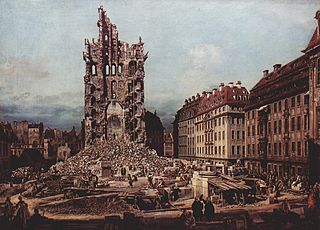 W
WThe Siege of Dresden took place in July 1760 during the Third Silesian War when a Prussian force led by Frederick the Great unsuccessfully besieged the city of Dresden in Saxony.
 W
WThe Battle of Freiberg was fought on 29 October 1762 and was the last great battle of the Third Silesian War.
 W
WThe Capture of Gorée occurred in December 1758 when a British naval expedition led by Augustus Keppel against the French island of Gorée off the coast of Senegal during the Seven Years' War.
 W
WThe Battle of Gross-Jägersdorf was a victory for the Russian force under Field Marshal Stepan Fyodorovich Apraksin over a smaller Prussian force commanded by Field Marshal Hans von Lehwaldt, during the Seven Years' War. This was the first battle in which Russia engaged during the Seven Years' War.
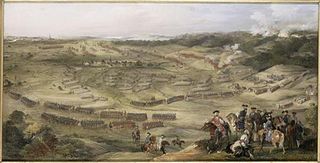 W
WThe Battle of Hastenbeck was fought as part of the Invasion of Hanover during the Seven Years' War between the allied forces of Hanover, Hesse-Kassel and Brunswick, and the French. The allies were defeated by the French army near Hamelin in the Electorate of Hanover.
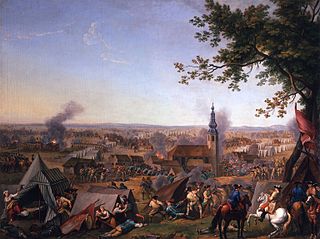 W
WThe Battle of Hochkirch took place on 14 October 1758, during the Third Silesian War. After several weeks of maneuvering for position, an Austrian army of 80,000 commanded by Lieutenant Field Marshal Leopold Josef Graf Daun surprised the Prussian army of 30,000–36,000 commanded by Frederick the Great. The Austrian army overwhelmed the Prussians and forced a general retreat. The battle took place in and around the village of Hochkirch, 9 kilometers (6 mi) east of Bautzen, Saxony.
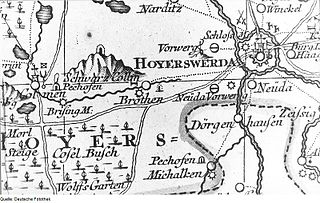 W
WThe Battle of Hoyerswerda was a minor encounter of September 25, 1759 during the Third Silesian War between Prussian and Austrian forces. Following on from the calamitous Prussian defeat at Kunersdorf in August however, this small victory for Frederick the Great, taken together with the one fashioned at Korbitz four days earlier by Friedrich August von Finck, no doubt proved a timely tonic to his fragile confidence.
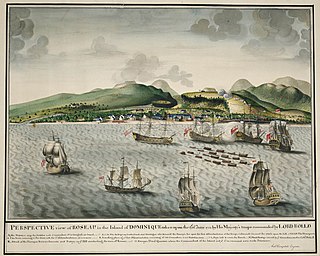 W
WThe Invasion of Dominica was a British military expedition to capture the Caribbean island of Dominica in June 1761, as part of the Seven Years' War.
 W
WThe British expedition against Guadeloupe was a military action from January to May 1759, as part of the Seven Years' War. A large British force had arrived in the West Indies, intending to seize French possessions. After a six-month-long battle to capture Guadeloupe they finally received the formal surrender of the island, just days before a large French relief force arrived under Admiral Maximin de Bompart.
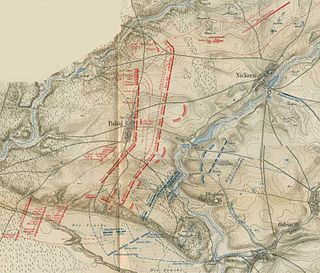 W
WThe Battle of Kay, also referred to as the Battle of Sulechów, Battle of Züllichau, or Battle of Paltzig, was an engagement fought on 23 July 1759 during the Seven Years' War. It occurred near Kay (Kije) in the Neumark, now part of Poland.
 W
WThe Battle of Kloster Kampen was a tactical French victory over a British and allied army in the Seven Years' War. The Allied forces were driven from the field.
 W
WThe Battle of Kolín on 18 June 1757 saw 54,000 Austrians under Count von Daun defeat 34,000 Prussians under Frederick the Great during the Third Silesian War. The Prussians lost 13,700 men; the Austrians 8,100.
 W
WThe Battle of Krefeld was a battle fought at Krefeld near the Rhine on 23 June 1758 between a Prussian-Hanoverian army and a French army during the Seven Years' War.
 W
WThe Battle of Kunersdorf occurred on 12 August 1759 near Kunersdorf immediately east of Frankfurt an der Oder. Part of the Third Silesian War and the wider Seven Years' War, the battle involved over 100,000 men. An Allied army commanded by Pyotr Saltykov and Ernst Gideon von Laudon that included 41,000 Russians and 18,500 Austrians defeated Frederick the Great's army of 50,900 Prussians.
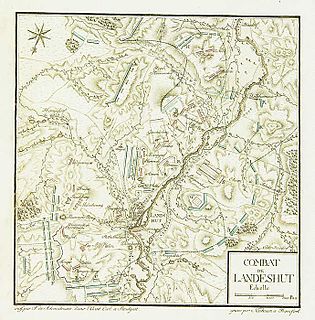 W
WThe Battle of Landeshut was an engagement fought on 23 June 1760 during the Third Silesian War.
 W
WThe Battle of Leuthen was fought on 5 December 1757 and involved Frederick the Great's Prussian Army using maneuver warfare and terrain to rout a larger Austrian force completely, which was commanded by Prince Charles of Lorraine and Count Leopold Joseph von Daun. The victory ensured Prussian control of Silesia during the Third Silesian War, which was part of the Seven Years' War.
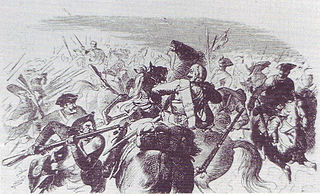 W
WThe Battle of Liegnitz on 15 August 1760 saw Frederick the Great's Prussian Army defeat the Austrian army under Ernst von Laudon during the Third Silesian War.
 W
WThe Battle of Lobositz or Lovosice also Lowositz on 1 October 1756 was the opening land battle of the Third Silesian War and the wider Seven Years' War. Frederick the Great's 28,000 Prussians were prevented by 33,000 Austrians under Maximilian Ulysses Count von Browne from continuing their invasion into the rich Bohemian plain, forcing Frederick to ultimately fall back north into Saxony for the winter.
 W
WThe Battle of Lutterberg took place on 10 October 1758 during the Seven Years' War between a French force of 42,000 commanded by Charles, Prince of Soubise and a much smaller Anglo-German force commanded by General Christoph Ludwig von Oberg.
 W
WThe Siege of Madras was a siege of Madras, which was then under English rule, between December 1758 and February 1759 by French forces under the command of Lally during the Seven Years' War. The British garrison was able to hold out until it was relieved. The British fired 26,554 cannonballs and more than 200,000 cartridge rounds in defence of the town. The failure to take Madras was a huge disappointment for the French and a massive setback to their campaign in India compounded by the later Battle of Wandiwash.
 W
WThe Battle of Manila was fought during the Seven Years' War, from 24 September 1762 to 6 October 1762, between the Kingdom of Great Britain and the Kingdom of Spain in and around Manila, the capital of the Philippines, a Spanish colony at that time. The British won, leading to a twenty-month occupation of Manila.
 W
WThe Battle of Marvão was a military action that took place during the Fantastic War and the Anglo-Spanish War and was part of the attempted Spanish and French invasion of Portugal in late 1762. A large Spanish force attacked the castle town of Marvão but was repelled and defeated by an Anglo Portuguese force under the command of Captain Thomas Browne.
 W
WThe Siege of Masulipatam was a British siege of the French-held town of Masulipatam in India during the Seven Years' War. The siege commenced on 6 March 1759 and lasted until the storming of the town by the British on the 7 April. The British were commanded by Colonel Francis Forde while the French defenders were under the command of Conflans.
 W
WThe Battle of Maxen was a battle at Maxen, in the Electorate of Saxony during the Third Silesian War. It resulted in surrender of a Prussian corps.
 W
WThe Battle of Minden was a major engagement during the Seven Years' War, fought on 1 August 1759. An Anglo-German army under the overall command of Prussian Field Marshal Ferdinand of Brunswick defeated a French army commanded by Marshal of France, Marquis de Contades. Two years previously, the French had launched a successful invasion of Hanover and attempted to impose an unpopular treaty of peace upon the allied nations of Britain, Hanover and Prussia. After a Prussian victory at Rossbach, and under pressure from Frederick the Great and William Pitt, King George II disavowed the treaty. In 1758, the allies launched a counter-offensive against the French and Saxon forces and drove them back across the Rhine.
 W
WThe Battle of Moys was a battle fought on 7 September 1757 during the Third Silesian War. A Prussian army of 13,000 men fought an Austrian army of double their size. The Prussians were defeated and their commander killed.
 W
WThe Battle of Nauheim was a battle of the Seven Years' War fought near Nauheim in the Landgraviate of Hessen-Kassel on 30 August 1762. French troops under the command of Louis Joseph, Prince of Condé defeated Hanoverian and British troops under the command of Duke Ferdinand of Brunswick.
 W
WThe Battle of Neuensund was a smaller battle at Neuensund of the Seven Years' War between Swedish and Prussian forces fought on September 18, 1761. The Swedish force under the command of Jacob Magnus Sprengtporten managed to rout the Prussian forces commanded by Wilhelm Sebastian von Belling.
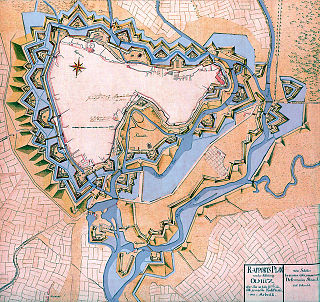 W
WThe siege of Olomouc took place in 1758 when a Prussian army led by Frederick the Great besieged the Austrian city of Olmütz during the Prussian invasion of Moravia in the Third Silesian War. The attempt stalled as the besiegers faced stronger resistance than Frederick had expected. With a lack of supplies and the approach of an Austrian relief force following the Battle of Domstadtl, Frederick abandoned the siege and withdrew from Moravia.
 W
WThe Siege of Pirna took place in 1756 as part of the Prussian invasion of Saxony during the Third Silesian War.
 W
WThe Battle of Plassey was a decisive victory of the British East India Company over the Nawab of Bengal and his French allies on 23 June 1757, under the leadership of Robert Clive. The battle helped the Company seize control of Bengal. Over the next hundred years, they seized control of most of the Indian subcontinent, Myanmar, and Afghanistan.
 W
WThe 1760–1761 Siege of Pondicherry was a conflict in the Third Carnatic War, as part of the global Seven Years' War. Lasting from 4 September 1760 to 15 January 1761, British land and naval forces besieged and eventually compelled the French garrison defending the French colonial outpost of Pondicherry to surrender. The city was running low on supplies and ammunitions when French commander Lally surrendered. It was the third British victory in the region that was under the command of Robert Clive.
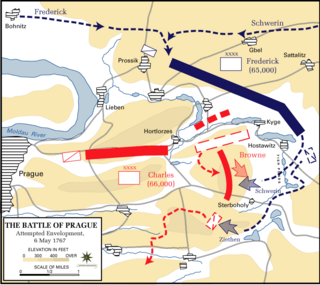 W
WIn the Battle of Prague or Battle of Štěrboholy, fought on 6 May 1757 during the Third Silesian War, Frederick the Great's 64,000 Prussians forced 61,000 Austrians to retreat, but having lost 14,300 men, decided he was not strong enough to attack Prague. The battle is mentioned in the famous German ballad Lenore written in 1773 by Gottfried August Bürger.
 W
WThe Battle of Reichenberg was a battle of the Third Silesian War, fought on 21 April 1757 near the town of Reichenberg in Bohemia.
 W
WThe Battle for the Río San Juan de Nicaragua was one of several important battles that took place during the Anglo-Spanish War, a subconflict of the Seven Years' War, which lasted from December 1761 until February 1763. The conflict, which took place in July–August 1762, began when William Lyttelton, the British governor and commander-in-chief of Jamaica, sent a naval expedition to Nicaragua with the primary objective of capturing the town of Granada.
 W
WThe Raid on Rochefort was a British amphibious attempt to capture the French Atlantic port of Rochefort in September 1757 during the Seven Years' War. The raid pioneered a new tactic of "descents" on the French coast, championed by William Pitt who had taken office a few months earlier.
 W
WThe Battle of Rossbach took place on 5 November 1757 during the Third Silesian War near the village of Rossbach (Roßbach), in the Electorate of Saxony. It is sometimes called the Battle of, or at, Reichardtswerben, after a different nearby town. In this 90-minute battle, Frederick the Great, king of Prussia, defeated an Allied army composed of French forces augmented by a contingent of the Reichsarmee of the Holy Roman Empire. The French and Imperial army included almost 42,000 men, opposing a considerably smaller Prussian force of 22,000. Despite overwhelming odds, Frederick employed rapid movement, a flanking maneuver and oblique order to achieve complete surprise.
 W
WThe Battle of Saint Cast was a military engagement during the Seven Years' War on the French coast between British naval and land expeditionary forces and French coastal defence forces. Fought on 11 September 1758, it was won by the French.
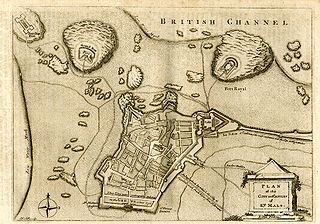 W
WThe Raid on St Malo took place in June 1758 when an amphibious British naval expedition landed close to the French port of St Malo in Brittany. While the town itself was not attacked, as had been initially planned, the British destroyed large amounts of shipping before re-embarking a week later. The naval forces were under the command of Richard Howe while the army was led by the Duke of Marlborough and Lord Sackville.
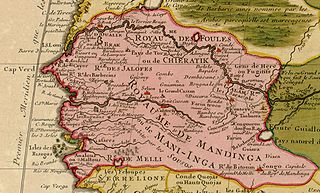 W
WThe Capture of Senegal took place in 1758 during the Seven Years' War with France, as part of a concerted British strategy to weaken the French economy by damaging her international trade. To this end, a succession of small British military expeditions landed in Senegal and captured Fort Saint Louis the French slave fort located at Saint-Louis and that of Gorée, seizing French vessels and supplies. By late 1758 the whole of the French colony on the Senegalese coast had been captured by the British, with administrative matters being handled by the first British Governor of Senegal, Lieutenant Colonel Richard Worge.
 W
WThe Spanish invasion of Portugal between 5 May and 24 November 1762 was a military episode in the wider Seven Years' War in which Spain and France were defeated by the Anglo-Portuguese Alliance with broad popular resistance. It involved at first the forces of Spain and Portugal until France and Great Britain intervened in the conflict on the side of their respective allies. The war was also strongly marked by guerrilla warfare in the mountainous country, which cut off supplies from Spain, and a hostile peasantry, which enforced a scorched earth policy as the invading armies approached that left the invaders starving and short of military supplies and forced them to retreat with heavy losses, mostly from starvation, disease, and desertion.
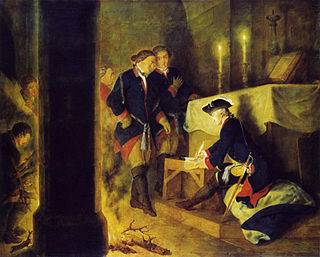 W
WIn the Battle of Torgau on 3 November 1760, King Frederick the Great's Prussian army fought a larger Austrian army under the command of Field Marshal Leopold Josef Graf Daun. The Prussians won a costly victory in one of the bloodiest battles of the Third Silesian War.
 W
WThe Battle of Valencia de Alcántara took place in August 1762 when an Anglo Portuguese force led by John Burgoyne surprised and captured the town of Valencia de Alcántara from its Spanish defenders during the Seven Years' War. The town was taken on 27 August as part of the defence against the Spanish invasion of Portugal.
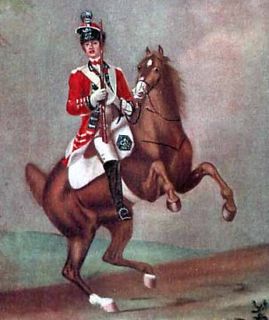 W
WThe Battle of Vila Velha or Battle of Vila Velha de Ródão took place in October 1762 when a British-Portuguese force led by John Burgoyne and Charles Lee surprised and recaptured the town of Vila Velha de Ródão from Spanish invaders during the Seven Years' War as part of the Spanish invasion of Portugal. Burgoyne, who took the Spanish base at Valencia de Alcántara two months earlier then marched against forces preparing to cross the River Tagus into Alentejo.
 W
WThe Battle of Villinghausen was a battle in the Seven Years' War fought on the 15th and 16 July 1761 in the western area of present-day Germany, between a large French army and a combined Prussian-Hanoverian-British force led by Prince Ferdinand of Brunswick.
 W
WThe Battle of Warburg was a battle fought on 31 July 1760 during the Seven Years' War. The Battle was a victory for the Hanoverians and the British against the French. British general John Manners, Marquess of Granby achieved some fame for charging at the head of the British cavalry and losing his hat and wig during the charge. The French lost 1500 men, killed and wounded, around 2,000 prisoners and ten pieces of artillery.
 W
WThe Battle of Wilhelmsthal was fought on 24 June 1762 during the Seven Years' War between the allied forces of Britain, Prussia, Hanover, Brunswick and Hesse under the command of the Duke of Brunswick against France. Once again, the French threatened Hanover, so the Allies manoeuvered around the French, surrounded the invasion force, and forced them to retreat. It was the last major action fought by Brunswick's force before the Peace of Paris brought an end to the war.
 W
WThe Battle of Zorndorf, during the Seven Years' War, was fought on 25 August 1758 between Russian troops commanded by Count William Fermor and a Prussian army commanded by King Frederick the Great. The battle was tactically inconclusive, with both armies holding their ground and claiming victory. The site of the battle was the Prussian village of Zorndorf.